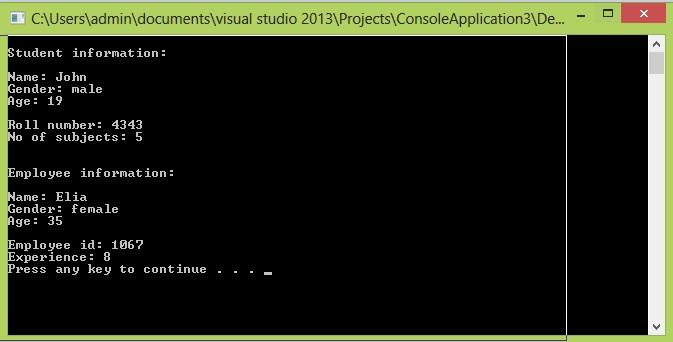Polymorphism
Submitted by Muzammil Muneer on Tuesday, October 28, 2014 - 11:52.
Polymorphism
In this part you will learn: 1. What is polymorphism 2. Why need polymorphism 3. What is virtual function 4. What is pure virtual function 5. Program 6. Output Polymorphism Polymorphism means having many forms. In c++, when we are dealing with classes and their inheritance, there occurs a case when we have more than one derived classes of the base class. Using polymorphism we can call a member function, which will, depending upon the type of object that invokes the function, cause a different function to perform. Polymorphism makes the program simple. Instead of calling different functions for different objects, using polymorphism we can use a base pointer to point to the object of the derived class. When we will call the function, the function defined in that object will be executed automatically. So it will make our program easy to work on. Virtual functions The concept of polymorphism is implemented using virtual functions. In virtual functions, we first declare the function as a virtual function. By this declaration, when the program will reach here and see that it is a virtual function. The program will try looking in the derived class for the overriding function of it. If there is no definition in the derived class, then the virtual function will be called. In general, when a function is declared as virtual, the program tries to reach till the derived class of which the object is made, the last function found is executed. syntax virtual return_type function_name(parameters) { //function definition } Pure Virtual functions By making a function pure virtual, the programmer is bound to define that function in the derived class, otherwise there would be an error in the code. Making a function pure virtual, we are not bound to define that function in the base class instead we just make it equivalent to zero. Syntax virtual return_type function_name(parameters)=0 { //can be empty } Program with polymorphism In the following example, I have coded the working of a school management system using polymorphism. Basic Step:- #include<iostream>
- #include<conio.h>
- using namespace std;
- class person
- {
- protected: //access specifier
- string name;
- string gender;
- int age;
- public:
- person(string n, string g, int a) :name(n), gender(g), age(a){
- }
- virtual void print_info() = 0;
- };
- class student :public person
- {
- public: //access specifier
- int roll_no;
- int no_of_subjects;
- student(string n, string g, int a, int r, int no) :person(n, g, a), roll_no(r), no_of_subjects(no){
- }
- void print_info(){
- cout << endl << "Student information:" << endl << endl;
- cout << "Name: " << name << endl;
- cout << "Gender: " << gender << endl;
- cout << "Age: " << age << endl << endl;
- cout << "Roll number: " << roll_no << endl;
- cout << "No of subjects: " << no_of_subjects << endl;
- }
- };
- class employee :public person
- {
- public:
- int employee_id;
- int experience;
- employee(string n, string g, int a, int e_id, int e) :person(n, g, a), employee_id(e_id), experience(e){
- }
- void print_info(){
- cout << endl << endl << "Employee information:" << endl << endl;
- cout << "Name: " << name << endl;
- cout << "Gender: " << gender << endl;
- cout << "Age: " << age << endl << endl;
- cout << "Employee id: " << employee_id << endl;
- cout << "Experience: " << experience << endl;
- }
- };
- int main()
- {
- person *arr[2];
- student s1("John", "male", 19, 4343, 5);
- employee e1("Elia", "female", 35, 1067, 8);
- arr[0] = &s1;
- arr[1] = &e1;
- arr[0]->print_info();
- arr[1]->print_info();
- }

Add new comment
- 83 views
